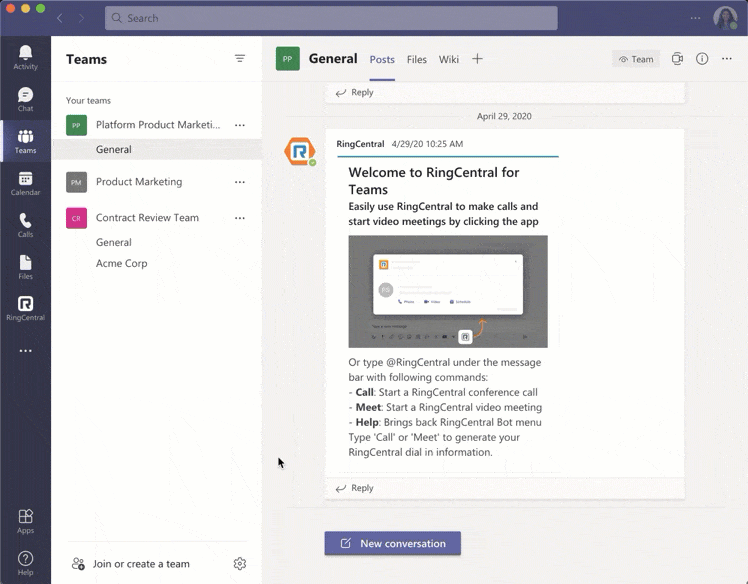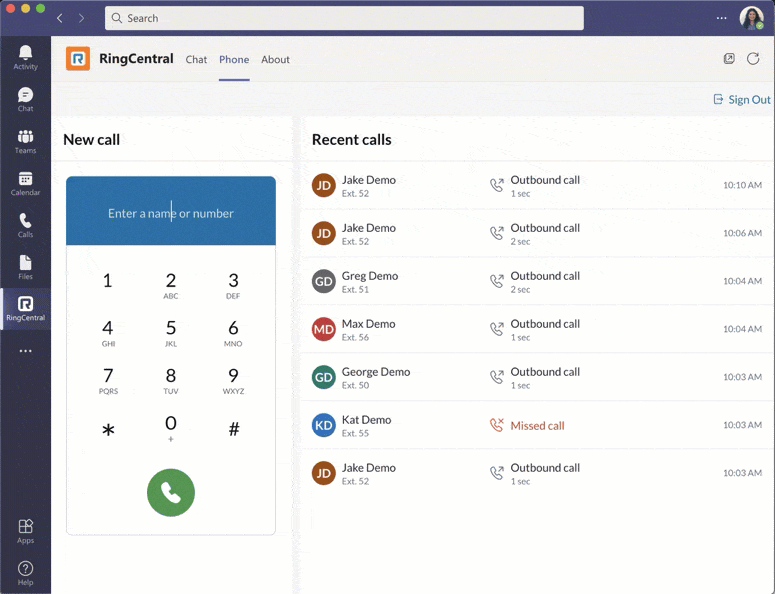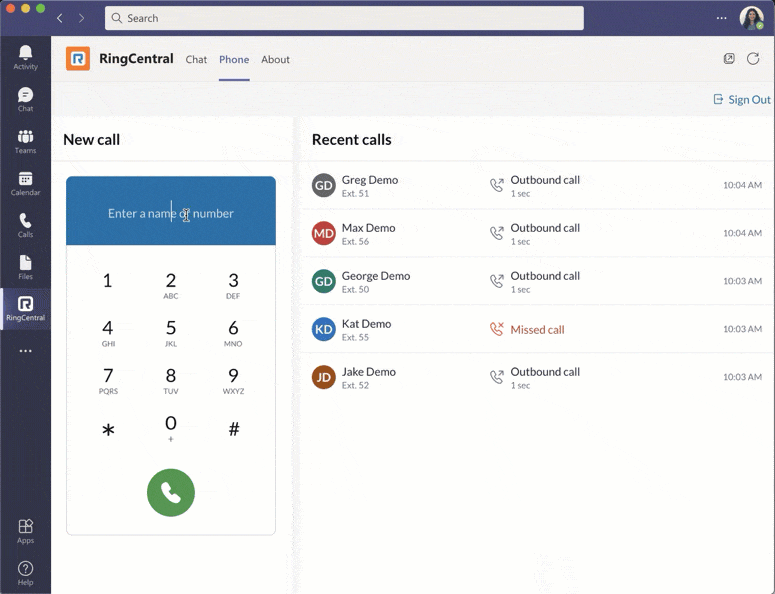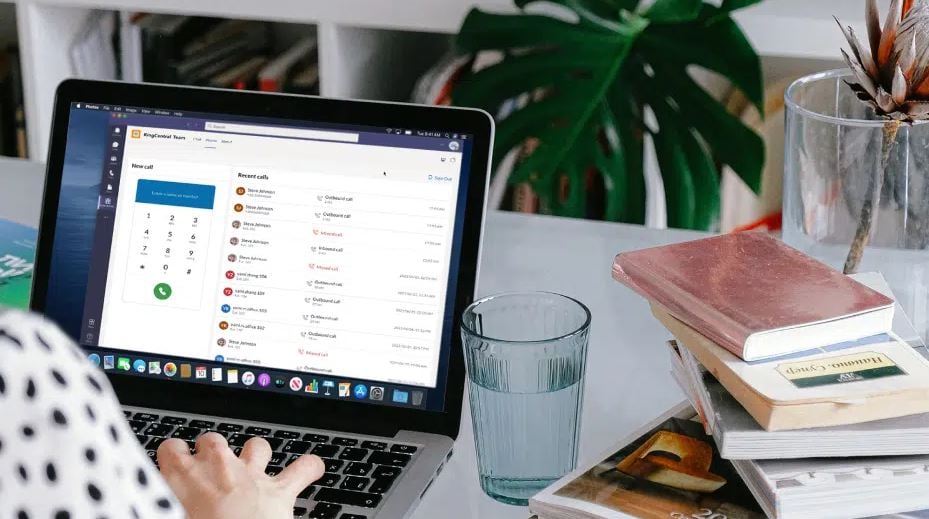Highlights:
- Microsoft Teams users can now add the RingCentral softphone dialler directly into their platform.
- The embedded dialler syncs with your RingCentral contacts for easy access so users can quickly make calls without searching numbers.
- Teams users can also use the RingCentral MVP app as a calling endpoint, with enterprise-grade features (Five 9s uptime SLA, custom IVRs, integrations) not offered in Teams.
- Calling in Microsoft Teams comes at no extra cost. With a RingCentral MVP subscription, you won’t have to pay the $10 phone system licence fees required by Microsoft.
If there’s one thing we’ve learned from the global pandemic, it’s that our communications are at the heart of how we work. Whether in the office, at home, or a mixed approach, message, call, and meet with colleagues from anywhere is essential to our success.
That meant expanding their Microsoft Teams suite for many businesses as people worked remotely—many for the first time. The collection of communication features helped teams navigate a world without the face-to-face interactions they get in the office.
Now, as businesses iron out their return to work plans, those tools have a vital role to play. This means, for most companies, Microsoft Teams is here to stay. And workers who’ve used Microsoft Teams alongside RingCentral will want to keep both.
So we listened. We’re excited to announce our newest update to the RingCentral for Microsoft Teams integration: the RingCentral dial-pad.
What’s new?
The RingCentral dial-pad is now embedded natively into Teams, allowing users to call contacts or extensions in their RingCentral contact list and dial any external phone number.

Accessing the softphone is incredibly easy:
- Click on the native R icon in your Teams left navigation bar to open the RingCentral tab.
- Use the Chat tab to make calls and start or join meetings with the RingCentral bot.
- Toggle to the Phone tab to use the RingCentral dialler to make calls and view a running list of your call history.

The embedded dialler matches your RingCentral contacts and extensions so you can quickly make calls without having to look up their number. You can also type in a specific phone number to the embedded dialler to make outbound calls without switching windows.
Enterprise-grade calling features

Users of both Microsoft Teams and RingCentral can now also use the RingCentral app as a calling endpoint. This gives users access to our enterprise-grade calling features, which include:
1. Five 9s reliability
Downtime can freeze teamwork in its tracks—and although they’re relatively infrequent these days, they can occur. When they do, businesses lose out on minutes or hours of innovation, collaboration, and revenue.
Keep your business up and running with limited downtimes with RingCentral’s 99.999% uptime SLA. That translates to just five minutes of downtime per year (including scheduled maintenance). Companies can rest assured knowing their users will always have access to their tools at any time.
Learn more about our reliability in our post, “What 99.999% uptime really means for your business.”
2. Seven layers of security
When you trust us with your data, we protect it at all costs. The RingCentral platform is built with the most robust security measures in the industry. From SSAE 18 and ISO 27001-audited data centres to multiple firewalls and intrusion detection systems, we’ve instituted extensive measures at every level of our infrastructure.
Learn more about how we protect your data in our Trust Center.
3. Integrations
Our RingCentral platform comes with thousands of pre-built integrations with your favourite business apps, including Salesforce, Google, and Microsoft 365. Our open platform gives you everything you need to build your own if you want a custom app.
Call in Microsoft Teams at no extra cost to you.
And the best part? Our RingCentral integration into Microsoft Teams comes at no extra cost to you. With a RingCentral MVP subscription, you don’t have to pay the $10 phone system license that Microsoft requires for calling with direct routing in Teams.
Enjoy all that RingCentral has to offer in Microsoft Teams
RingCentral for Microsoft Teams allows users to:
- Make calls natively: Dial any phone number, extension, or RingCentral contact through the embedded dialler.
- Call history: View call history, including missed, received, and outbound calls.
- Meet: Start a RingCentral Video meeting.
- Manage meetings: Schedule a RingCentral Video meeting in the Teams calendar with an auto-generated or customised password.
- Join meetings: In-chat meeting cards and global dial-in numbers allows team members to connect in seconds.
@ mention RingCentral in a Teams conversation to bring up bot commands, including:
- Meet: Start a RingCentral video meeting
- Help: Brings back the RingCentral Bot menu
- Login: Login to RingCentral in a single command
- Logout: Logout of RingCentral
Get the RingCentral for Microsoft Teams integration today
Visit the RingCentral App Gallery to start using the Teams integration or add RingCentral from the app store within Microsoft Teams.
Originally published 13 Aug, 2021, updated 07 Sep, 2021





